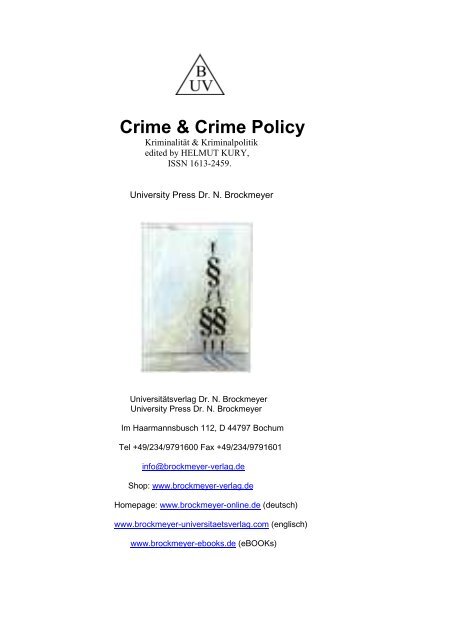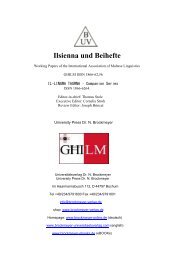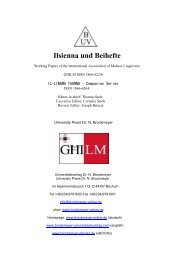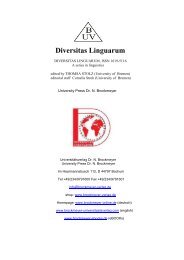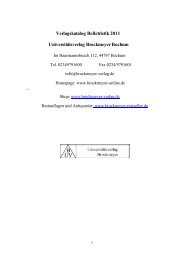Crime & Crime policy
Create successful ePaper yourself
Turn your PDF publications into a flip-book with our unique Google optimized e-Paper software.
<strong>Crime</strong> & <strong>Crime</strong> Policy<br />
Kriminalität & Kriminalpolitik<br />
edited by HELMUT KURY,<br />
ISSN 1613-2459.<br />
University Press Dr. N. Brockmeyer<br />
Universitätsverlag Dr. N. Brockmeyer<br />
University Press Dr. N. Brockmeyer<br />
Im Haarmannsbusch 112, D 44797 Bochum<br />
Tel +49/234/9791600 Fax +49/234/9791601<br />
info@brockmeyer-verlag.de<br />
Shop: www.brockmeyer-verlag.de<br />
Homepage: www.brockmeyer-online.de (deutsch)<br />
www.brockmeyer-universitaetsverlag.com (englisch)<br />
www.brockmeyer-ebooks.de (eBOOKs)
Helmut Kury (Ed.): "Strafrecht und Kriminalität".<br />
Bd. 1: Entwicklungen in Mittel- und Osteuropa. Bochum 2004, ISBN 3-8196-0649-1, kart.<br />
XII, 309 S. € 19,80 ( in German)<br />
Inhalt: P. Drexler, Grußwort H. Kury, Einleitung 1. Kriminalität und<br />
Kriminalitätsentwicklung in Ost und West H. Kury, Kriminalitätsentwicklung. Sanktionen<br />
und die Einstellung der Bevölkerung. Ein Vergleich zwischen Ost und West. A. Gabusjan/A.<br />
Margarjan, Tendenzen der Kriminalität in Armenien in der Übergangszeit. A. Aliev,<br />
Kriminalität in Aserbaidschan, Struktur, Bedeutung und Wechselverhältnis zwischen den<br />
verschiedenen Kriminalitätsarten: Straftaten gegen das Eigentum, organisierte Kriminalität,<br />
Sittlichkeitsverbrechen. G. Glonti, Kriminologische Charakteristika der Korruption in<br />
Georgien: Realität und Perspektiven. G. Neurohr, Die Bedrohung der Entwicklung<br />
demokratischer Prozesse, Institutionen und regionaler Stabilität durch u.a. Korruption der<br />
Sicherheitsbehörden. E. Ciklauri-Lammich, Organisierte Kriminalität und Korruption, sowie<br />
deren Bekämpfung in Deutschland. G. Todria, Rezeptionsprobleme bei der Gestaltung der<br />
kriminologischen Programme zur Verbrechensbekämpfung. 2. Strafrechtsentwicklung in Ost<br />
und West S. Arakelyan, Entwicklung des Strafrechts in Armenien. R.A. Gjulalijeva, Die<br />
Entwicklung des Strafrechts in Aserbaidschan. O. Gamkrelidze, Entwicklung des Strafrechts<br />
im postsowjetischen Georgien. S. Lammich, Aktuelle Tendenzen in der internationalen<br />
Zusammenarbeit in Strafsachen. A. Nussberger, Die Bedeutung der Europäischen<br />
Menschenrechtskonvention für die Entwicklung der strafrechtlichen Sanktionspraxis in den<br />
mittel- und osteuropäischen Staaten. Zur Fallrechtsprechung des Europäischen Gerichthofs<br />
für Menschenrechte als Orientierungspraxis für die Reformen in Georgien. 3.<br />
Sanktionsentwicklung - Sanktioneneinstellungen I. Hassanov, Entwicklung der<br />
strafrechtlichen Sanktionen in der Republik Aserbaidschan. H. Kury/K. Kapanadze,<br />
Strafvollzug in Georgien - Ergebnisse einer Umfrage bei Inhaftierten und Angehörigen der<br />
Strafverfolgung. T. Yoshida, Strafrechtliche Sanktionen und Einstellungen zu Sanktionen in<br />
Japan. 4. Strafvollzug A. Sargsyan, Reformen des Strafvollzugssystems in der Republik<br />
Armenien. M. Humbatov, Der Vollzug der Freiheitsstrafen in der Republik Aserbaidschan. K.<br />
Koberidze, Das Strafvollzugssystem von Georgien - Probleme, Realität, Entwicklung.<br />
H.Müller-Dietz, Strafvollzugsrecht und Praxis des Strafvollzugs aus (west)europäischer Sicht:<br />
Entwicklungsmöglichkeiten. J. Walter, Grundvoraussetzungen eines modernen Strafvollzugs<br />
aus der Sicht eines deutschen Anstaltsleiters. R. Wulf, Strafvollzug in Baden-Württemberg:<br />
Bürger schützen, Menschenrechte achten, Unternehmen führen. D. Krauss, Alternativen zu<br />
harten Sanktionen: Hilft weniger Strafen mehr? Eine Zusammenfassung der<br />
Tagungsergebnisse. Kriminalpolitische Empfehlungen der Teilnehmer der Tbilisi-Konferenz.<br />
Extract/Leseprobe: http://www.libreka.de/9783819606496
Helmut Kury. & Elmar Karimov (Eds): "Kriminalität und<br />
Kriminalprävention in Ländern des Umbruchs".<br />
Bd. 2: Beiträge einer Internationalen Konferenz in Baku/Aserbaidschan, Bochum 2006, ISBN<br />
978-3-8196-0672-4, kart. XVI, 495 S. € 39,90 (in German)<br />
U. Mitter, Grußwort H. Kury, Vorwort I. Aktuelle Tendenzen der Kriminalitätsentwicklung,<br />
insbes. hinsichtlich Jugendkriminalität - Gewaltkriminalität - Gewalt in der Familie 1)<br />
Aktuelle Entwicklung der Kriminalität. W. Heinz, Kriminalitätsentwicklung in Deutschland<br />
unter bes. Berücksichtigung der Jugend- und Gewaltkriminalität. D. Schestakov, Kriminalität<br />
und ihre Entwicklung in Russland. B. Rozovsky, Kriminalität und Macht in der Ukraine in der<br />
Übergangsperiode. Ein geschlossener Kreis. 2) Organisierte Kriminalität und Korruption in<br />
Ländern des Umbruchs. G. Glonti, Analyse der gegenwärtigen Kriminalitätsentwicklung in<br />
Georgien. S. Lammich, Georgien - Ein Jahr nach der "Rosenrevolution".<br />
Korruptionsbekämpfung, Privatisierung sowie Steuer- und Vermögensamnestie. I. Abbasow,<br />
Korruption und ihre Bekämpfung. W. Poklad, Die Miliz in der Ukraine und das Problem der<br />
Korruption. S. U. Dikayew, Heutige Probleme der Terrorismusbekämpfung in Russland. I.<br />
Mahammad, Terrorismus - Von der Antike bis zur Gegenwart. 3) Häusliche Gewalt. H. Kury,<br />
Gewalt in der Familie- Ergebnisse aus Deutschland. A. Dyatschenko, Kriminelle sexuelle<br />
Gewalt. Eine vergleichende Analyse des StGB der russischen Föderation und der GUS<br />
Länder. D. Schestakov, Familienkriminologie und Gesetzgebung zur Prävention häuslicher<br />
Gewalt. F.S. Karimov, Kriminologische Aspekte der Gewalt in der Familie. B. G.<br />
Tugelbayewa/A. D. Hamzayewa, Genderaspekte bei abweichendem Verhalten in der Familie.<br />
M. Kudratow, Gewalt in der Familie. Schlussfolgerungen aus Tadschikistan. J. Prikolotina,<br />
Die Prävention familiärer Gewalt in der Ukraine - Absichtserklärung und Realität. II.<br />
Strafrechtsentwicklung und Kriminalprävention – Internationale Zusammenarbeit -<br />
Menschenrechte 1) Strafrechtentwicklung F..C. Schröder, Die neuere Entwicklung des<br />
Strafrechts in Deutschland M.B. Ahmedov, Entwicklung der aserbaidschanischen<br />
Strafgesetzgebung in Bezug auf den Schutz der Grundrechte. T. Shapirov, Zur<br />
Strafrechtsreform in der Republik Tadschikistan. N.Turetschkiy, Koordinierung der<br />
Maßnahmen zur Kriminalprävention in Kasachstan. A. Serrano-Maíllo, Punitivität und<br />
Gesetzgebung - Die Situation in Spanien. D. Krauss, Strafprozessrecht und Probleme des<br />
Strafverfahrens in Staaten des Umbruchs am Beispiel der Gesetzgebung in Georgien. 2)<br />
Menschenrechte - internationale Verträge. C. Schmidt, Menschenrechte - Internationale<br />
Verträge und Kooperation, Minderheitenschutz. E. Suleymanowa, Die Rolle des<br />
Ombudsmanns und der Schutz der Menschenrechte. III. Kriminalprävention: "Vorbeugung"<br />
oder "Nachbehandlung"? Der Stellenwert von Sanktionen - Strafvollzug - Alternativen. 1)<br />
Kriminalprävention. K. Sessar, Kriminalprävention als gesellschaftliche Aufgabe. W. Heinz,<br />
Kriminalprävention auf justitieller Ebene: Hilft weniger mehr? Alternativen zu "klassischen"<br />
Sanktionen: Erfahrungen aus Deutschland. M. Salimov, Das Wesen der Strafe gemäß dem<br />
StGB der Republik Aserbaidschan und Probleme bei ihrer Anwendung. F.Y Semandarow,<br />
Die Strafe - Ihre Stellung und Rolle bei der Kriminalitätsbekämpfung. E. Karimow, Zum<br />
Wesen und Ihnalt der Strafe. K.I. Dshayanbayew, Ein Programm zur Bekämpfung der<br />
Kriminalität in der Republik Kirgisien: Probleme und Perspektiven. B.Kvirikashvili,<br />
Hauptprobleme der Kriminalprävention in der gegenwärtigen Entwicklung Georgiens. 2)<br />
Probleme des Strafvollzugs (Freiheitsstrafe) und Suche nach Alternativen. M. Humbatov,<br />
Klassifizierung der zu einer Freiheitsstrafe Verurteilten in der Republik Aserbaidschan. A.<br />
Ismayilow, Untersuchungshaft als Vorbeugungsmaßnahme. R. Wulf, Gesundheit im<br />
Gefängnis: Europäische Standards und ihre Umsetzung in Deutschland. T. Yoshida, Gewalt<br />
von Strafvollzugsbediensteten gegenüber Insassen - Ein Bericht aus Japan. T. Yoshida,
Restorative Justice - Ein Bericht aus Japan. 3) Gesellschaft und Kriminalität -<br />
Sanktionseinstellungen V. Golbert, Kriminalität und Kriminalitätskontrolle als Aspekt des<br />
sozialen Umbruchs - Kritische Kommentare. H. Kury/M.Keller/U. Mitter/N.Rahmati,<br />
Verbrechensfurcht, Punitivität und Einstellung zur Polizei - Ergebnisse einer Umfrage in<br />
Aserbaidschan. IV. Schlussbetrachtungen D. Krauss, Die Entwicklung des Strafrechts und der<br />
Sanktionspraxis in Ost und West: Ist weniger mehr? Eine Schlussbetrachtung.<br />
http://www.libreka.de/9783819606724<br />
Extract/Leseprobe:
Helmut Kury (Ed.): „Fear of <strong>Crime</strong> – Punitivity“.<br />
New Developments in Theory and Research. Bochum 2008, XVII, 492 S kartoniert<br />
(Paperback), Softcover, ISBN 978-3-8196-0688-5 (<strong>Crime</strong> & <strong>Crime</strong> Policy Vol.. 3)kartonierte<br />
Ausgabe € 44,90 ( in English)<br />
(Hardcover) ISBN 978-3-8196-0695-3gebundene Ausgabe € 54,90<br />
The Pdf edition you can find by our eBook shop: www.brockmeyer-ebooks.de<br />
€ 20,00<br />
Inhalt/Content: H.-J. Kerner, Foreword H. Kury, Introduction<br />
Fear of <strong>Crime</strong>: E. Gray/J. Jackson/St. Farrall, Researching Everyday Emotions:Towards a<br />
Multi-disciplinary Investigation of the Fear of <strong>Crime</strong>. K. Sessar, Fear of <strong>Crime</strong> or Fear of<br />
Risk? Some Considerations resulting from Fea of <strong>Crime</strong> Studies and their political<br />
implications. G.Vanderveen, How to measure „Fear of <strong>Crime</strong>“ in a valid and reliable way? H.<br />
Kury/J. Obergfell-Fuchs, Measuring Fear of <strong>Crime</strong>: How valid are the results? A quantitative<br />
and qualitative approach. H.L. Kaal/G. Vanderveen/M.E. van Oeveren, Spatial Perception of<br />
Unsafety, <strong>Crime</strong> and Disorder. H. Hirtenlehner, Vulnerability – Mediating the Perceived Risk<br />
– Fear of Victimization – Linkage? Testing a Transactional Theory of Fear of <strong>Crime</strong> Using<br />
Data from Austria. H. Hirtenlehner, Disorder, Social Anxieties and Fear of <strong>Crime</strong> with a<br />
pezial Focus on generalized Insecurities. C. Zarafonitou, Fear of <strong>Crime</strong> and Victimisation:<br />
The Greek Experience. G. Meško/I Kovčo-Vukadin/E. Muratbegović, Social-Demographic<br />
and Social Psychological-Perspectives of Fear of <strong>Crime</strong> in Slovenia, Croatia and Bosnia and<br />
Herzegovina.<br />
Punitivity: S. Maruna/A. Matravers/A. King, Disowning our shadow: A psychoanalytic<br />
approach to understanding punitive public attitudes; S. Maruna/A. King, Public Opinion and<br />
Community Penalties; D.A. Green, Political Culture and Incentives to Penal Populism; H.<br />
Kury/J. Obergfell-Fuchs, Methodological Problems in Measuring Attitudes to Punishment<br />
(Punitivity). A quantitative and qualitative approach; J. Obergfell-Fuchs, „Punitivity“ within<br />
the Criminal Justice System in Germany; A. Serrano-Maíllo/H. Kury, Insecurity Feelings and<br />
Punitivity: Relationship in a National Sample of Adolescents and Young Adults in Spain; T.F.<br />
Hartnagel/L. Templeton, Perceptions, Emotions and Experiences of <strong>Crime</strong>: Effects on<br />
Attitudes toward Punishment in a Canadian Sample. A. Kossowska/I. Rzeplinska/D.<br />
Wozniakowska/K. Witold, Criminal Policy based on Fear of <strong>Crime</strong> (Case of Poland); T.<br />
Yoshida, Problems associated with harsher sanctioning. Trends in returning to more severe<br />
punishment in Japan; H. Hirtenlehner, Which sentencing Goals do Victims of <strong>Crime</strong> in<br />
Austria support? Impressions from an Urban Victim Cohort; H. Elffers/J.W. de Keijser,<br />
Different Perspectives, different Gaps. Does the General Public Demand a more Responsive<br />
Judge? J.W. de Keijser/H. Elffers/H.G. van de Bunt, Responsive but Misunderstood. Dutch<br />
Judges on their Relation to Society<br />
Extract:<br />
http://books.google.de/books?printsec=frontcover&id=X8ll0ravD_oC#v=onepage&q&f=false
Helmut Kury & Theodore N. Ferdinand (Eds.):<br />
"International Perspectives on Punitivity".<br />
Bochum 2008, VI, 242 S. ISBN 978-3-8196-0693-9, kart (Softcover) (<strong>Crime</strong> & <strong>Crime</strong> Policy<br />
Vol 4) kartoniert € 29,90 (in English)<br />
Hardcover edition , gebunden ISBN 978-3-8196-0694-6 € 39,90<br />
The PdF Edition you can find by our eBOOk shop. www.brockmeyer-ebooks.de<br />
€ 12,00<br />
Inhalt/Content: H. Kury & Th. N. Ferdinand, Punitivity - An Introduction. J. J. Savelsberg,<br />
Punitiveness in Cross-National Comparison: Toward a Historically and Institutionally<br />
Grounded Multi-Factorial Approach; A. Nellis/J.P. Lynch, <strong>Crime</strong>, Fear and the Demand for<br />
Punishment in the United States; J.V. Roberts/J.B. Sprott, Exploring the Differences between<br />
Punitive and Moderate Penal Policies in the United States and Canada; Th. N. Ferdinnand/H.<br />
Kury, Punitivity in the United States; H.Kury/Th.N. Ferdinand/J. Obergfell-Fuchs, Punitivity<br />
in Germany: Attitudes to Punishment, Sentencing and Prison Rates; E. Kiza, Post war<br />
Societies and Punitivity:The Inquiry into an Underexplored Field of Research; H. C. Rohne,<br />
Conceptualizing Punitiveness From A Victims’ Perspective - Findings in the Context of the<br />
Al-Aqsa Intifada; L. Sebba, Punitiveness in International Criminal Justice: Some<br />
Explorations; D. Indermaur, Reducing Punitiveness: Strategies for Engendering a more<br />
Informed <strong>Crime</strong> Policy; H. Kury & Th. N. Ferdinand, Epilogue.<br />
Extract:<br />
http://books.google.de/books?printsec=frontcover&id=Zl42nbN5qBIC#v=onepage&q&f=fals<br />
e
Winterdyk, J./Reichel, Ph. & H. Dammer (Eds.): A Guided<br />
Reader to Research in Comparative Criminology/Criminal<br />
Justice. (in english)<br />
(<strong>Crime</strong> & <strong>Crime</strong> Policy 5) 2009, 288 S. ISBN 978-3-8196-0717-2 (Softcover) € 39,90<br />
The PdF Edition you can find by our eBOOk shop. www.brockmeyer-ebooks.de<br />
€ 18,00<br />
Inhalt/Content: H. Kury: Foreword J. Winteryk, Ph. Reichel & H. Dammer:<br />
Acknowledgements Chapter 1: C. Banks: Questions, Weblinks Chapter 2: J. Prinsloo & B.<br />
Naude: „Organized crime and corruption in South(ern) Africa“. Questions, Weblinks Chapter<br />
3: L. Sebba: „Punitiveness in international criminal justice: Some explorations“. Questions,<br />
Weblinks Chapter 4: W. F. McDonald: „American and European paths to international law<br />
enforcement cooperation: McDonalization“. Questions, Weblinks Chapter 5: B. Naude: <strong>Crime</strong><br />
against the person in Sub-Saharan Africa: A comparison of ten countries“. Questions,<br />
Weblinks Chapter 6: N. Ammar: Arab women in their State's Constitution. Questions,<br />
weblinks Chapter 7: J. V. Roberts, H. Johnson & M. G. Grossman: „Trends in crimes of<br />
sexual aggression in Canada: An analysis of police-reported and victimization statistics“.<br />
Questions, Weblinks. Chapter 8: H.-E.Sung & D. Chu: „Does participation in the global<br />
economy reduce political corruption? An emirical inquiry.“ Questions, Weblinks Chapter 9: J.<br />
Van Dijk & M. Shaw: „The International <strong>Crime</strong> (Victim) Survey: Impact and future <strong>policy</strong><br />
implications“. Questions, Weblinks Appendix A: R. Barberet: „Mainstreaming comparative<br />
methodology in criminal justice/criminology research methods courses“. Research in the area<br />
of comparative criminology and comparative criminal justice has become a burgeoning means<br />
of inquiry among a growing number of academics and scholars. However todate, there have<br />
been no texts or formalized guidelines in how to engage in such inquiry. With this<br />
publications the editors offer the first comprehensive text designed to assist, facilitate and<br />
guide interested researchers in how to engage in comparative criminological/criminal justice<br />
research. The editors, already well recognized in the field, have collected a series of nine<br />
articles which serve as iluustrative examples to facilitate the reader in how to conduct such<br />
research. Each of the articles is accompanied with a series of questions and useful web-links<br />
to further assist the reader and/or student.<br />
Extract:<br />
http://books.google.de/books?printsec=frontcover&id=sNJpLAYATVUC#v=onepage&q&f=f<br />
alse
Jäger, Bernd: Die sozialpädagogische Betreuung von<br />
straffälligen Menschen in der Bewährungshilfe<br />
-Ein Ländervergleich- (Kriminalität und Kriminalpolitik 6/<strong>Crime</strong> and <strong>Crime</strong> Policy 6) 2010,<br />
ISBN 978-3-8196-0756-1, kart. ca. 375 S. € 39,90 ( in German) leider vergriffen! Out of<br />
print!<br />
The PdF Edition you can find by our eBOOk shop: www.brockmeyer-ebooks.de<br />
€ 18,00<br />
Die Bewährungshilfe hat sich seit ihrer Einführung neben dem Straf- und Maßregelvollzug<br />
mittlerweile zu einer dritten Säule der Strafvollstreckung entwickelt. Sie stellt damit eine<br />
wesentliche Alternative zur Freiheitsstrafe dar. In einem bis heute andauernden Prozess ist die<br />
Bewährungshilfe verschiedensten Veränderungen unterworfen. Die kontroverse Diskussion<br />
um die Privatisierung von öffentlichen Leistungen, hat mittlerweile auch den Sektor des<br />
Strafvollzuges und damit die Bewährungshilfe erfasst. Als erstes Bundesland hat Baden-<br />
Württemberg im Jahre 2007 die Bewährungshilfe einer privaten Organisation übertragen. Die<br />
Arbeit vergleicht die privaten Bewährungshilfeorganisationen Österreichs und der<br />
Niederlande mit dem öffentlichen System der BRD. Neben einer umfassenden Beschreibung<br />
der Organisationsstrukturen werden Handlungsabläufe in der Bewährungshilfearbeit<br />
dargelegt, wobei qualitative Aspekte der sozialpädagogischen Tätigkeit fokussiert werden.<br />
Eine abschließende Diskussion stellt aus dem Vergleich der Systeme Anregungen für eine<br />
Weiterentwicklung der deutschen Bewährungshilfe, im Sinne einer Verbesserung der<br />
Dienstleistungsqualität, vor. Das vorliegende Buch dient aufgrund der umfassenden<br />
Beschreibung und weitreichenden Gliederung auch als Arbeits- und Diskussionsgrundlage für<br />
die Bewährungshilfe in den beschriebenen Ländern. BERND HUBERT JÄGER: Jahrgang<br />
1970. Ausbildung zum Chemisch-Technischen-Assistenten in Köln, Studium der Sozialarbeit<br />
an der KFH Aachen. Ableistung des Anerkennungsjahres im sozialpsychiatrischen Dienst des<br />
Gesundheitsamtes Kreis Aachen. Seit 01.01 2001 im Sozialdienst der JVA Mannheim.<br />
Abschluss des Masterstudienganges Führung und Leitung von Gesundheits- und<br />
Sozialdiensten an der KFH Aachen Anfang 2004. Promotion im Fachbereich<br />
Erziehungswissenschaften an der Johann Wolfgang Goethe Universität zu Frankfurt am Main<br />
Extract, Leseprobe:<br />
http://books.google.de/books?printsec=frontcover&id=vuXYr18oKpYC#v=onepage&q&f=fa<br />
lse
Becker-Oehm, Sybille : Die Kriminologische<br />
Regionalanalyse (in German)<br />
Notwendige Ausgangsbasis für die Kommunale Kriminalprävention? (Kriminalität und<br />
Kriminalpolitik 7/<strong>Crime</strong> and <strong>Crime</strong> Policy 7) 2010, ISBN 978-3-8196-0770-7) 98 S. € 13,90<br />
The PdF Edition you can find by our eBOOk shop www.brockmeyer-ebooks.de<br />
€ 6,00<br />
Das Phänomen der 'Kommunalen Kriminalprävention' existiert in der Bundesrepublik<br />
Deutschland nun seit annähernd 20 Jahren. Vielerorts haben sich Sicherheitspartnerschaften,<br />
„Runde Tische“ und Kriminalpräventive Räte aus Vertretern verschiedener Behörden,<br />
Vereine, Kirchen, Schulen und diverser anderer Institutionen zum Ziel gesetzt, die<br />
Sicherheitslage in den Städten bzw. Kommunen sowie die Lebensqualität der Bürger zu<br />
verbessern. Die 'Kommunale Kriminalprävention' soll Partizipation, die Einbindung<br />
vielfältigen Sachverstandes sowie Synergieeffekte durch regelmäßige Interaktion und<br />
Kooperation, Orientierung an konkreten, regionalen (Kriminalitäts-) Problemen, innovative<br />
Lösungsmöglichkeiten sowie die Eröffnung neuer Perspektiven durch viele unterschiedliche<br />
Akteure ermöglichen und folglich zur Wiederbelebung sozialer Netzwerke beitragen. Leider<br />
fehlt es jedoch häufig an einer stabilen datenmäßigen Ausgangsbasis, von der ausgehend man<br />
zielgerichtete Strategien planen könnte und ferner an der Evaluation durchgeführter<br />
Strategien. Potential bergende Projekte verlaufen nach kurzer Zeit häufig im Sande. Es wird<br />
hier untersucht, ob und inwiefern diesen Problemen durch das Erstellen sog.<br />
'Kriminologischer Regionalanalysen', einer spezifischen Form der Lagebilderstellung, im<br />
Vorfeld kommunaler Präventionsaktivitäten Abhilfe geschaffen werden kann und ob diese<br />
eine effektivere, ökonomischere und zielgerichtete kommunale Kriminalprävention<br />
ermöglichen.. Sybille Becker-Oehm *1980, Kriminalkommisarin beim Landeskriminalamt<br />
des Saarlandes. Studium der Kriminologie in Hamburg (Masterstudiengang); dies ist ihre<br />
erweiterte Masterarbeit mit einem ausführlichen Vorwort von Helmut Kury.<br />
Extract,/Leseprobe:<br />
http://www.libreka.de/9783819607707/FC#X2ludGVybmFsX0ZsYXNoRmlkZWxpdHk/eG1<br />
saWQ9OTc4MzgxOTYwNzcwNyUyRkZDJmltYWdlcGFnZT1GQw==
Kury, Helmut/Shea, Evelyn (Eds.): Punitivity<br />
International Developments<br />
Vol. 1: Punitiveness – a Global Phenomenon? (<strong>Crime</strong> & <strong>Crime</strong> Policy Vol. 8/1) Bochum<br />
2011, ISBN 978-3-8196-0777-6, Softcover. 440 pp. 24 x 17 cm. € 49,90 (in English)<br />
The PdF Edition you can find by our eBOOk shop www.brockmeyer-ebooks.de<br />
€ 25,00<br />
During the past two decades criminological discussion in Western industrial societies has<br />
been increasingly focused on the concept of punitiveness, a concept that is frequently linked<br />
to the staggering rise in inmate numbers in the United States from the first half of the 1970<br />
onward, making it the country with the highest prison rate per 100,000 inhabitants in the<br />
Western world. Lee sees the development in the United States in connexion with the growing<br />
discussion of "fear of crime" during the late 1960s. "Since the late 1960s the fear of crime has<br />
progressively become a profoundly engaging field of study for criminologists and other social<br />
researchers" (2001, p. 467; see also Hale 1996). The findings of inquiries and opinion polls,<br />
which confirmed the presence of such fears among the population, moved the topic to the<br />
forefront and it did not take long until it was "discovered" by politicians. This development<br />
went hand in hand with increased media reporting on crime related matters, usually<br />
concerning spectacular cases, and thus creating in the population a distorted image of the<br />
actual extent and nature of crime (see Beckett and Sasson 2004). Some politicians were quick<br />
to use this erroneous perception for their own purposes by creating so-called "politics of fear"<br />
(see, for instance, for Japan Miyazawa 2008).<br />
Content/Inhalt:<br />
Kury, Helmut & Shea, Evelyn Punitivity – An Introduction.<br />
I.1. Theoretical Background and Methodological Questions:<br />
Hirtenlehner, Helmut: The Origins of Punitive Mentalities in late modern Societies. Testing<br />
an Expressive Explanatory Model; Almond, Paul: Corporate <strong>Crime</strong> and the ‘Crippled<br />
Epistemology’ of Punitiveness; Simonson, Julia: Problems in Measuring Punitiveness –<br />
Results from a German Study; Hamilton, Claire: ‚Notes from some small Countries’: A Study<br />
of the ‚New Punitiveness’ in Ireland, Scotland and New Zealand; Harrendorf, Stefan: How to<br />
Measure Punitiveness in Global Perspective: What Can be Learned from International Survey<br />
Data.<br />
I.2. Different Trends in Punitiveness:<br />
Kutateladze, Besiki: Measuring State Punitiveness in the United States; Indermaur, David &<br />
Roberts, Lynne: Punitiveness in Australia: Current Status, Trends and Strategic Responses;<br />
Dijk, Jan Van: Trends in Dutch Prisoner Rates: Regression to the Mean or enduring<br />
Exception? Flander, Benjamin & Meško, Gorazd: ‚Punitiveness’ and Penal Trends in<br />
Slovenia: On the ‚Shady Side of the Alps’? Lappi-Seppälä, Tapio: Changes in Penal Policy in
Finland; Klimke, Daniela, Sack, Fritz & Schlepper, Christina: Stopping the ‘punitive turn’ at<br />
the German Border.<br />
I.3. Juvenile Delinquents:<br />
A Category Apart? Palermo Fabris, Elisabetta: Juvenile Deviance in Italy. The need for Social<br />
Control and for the Tutelage of young Offenders; Wößner, Gunda, Quenzer, Carolin & Vig,<br />
David: The Development of Criminal Law in Germany with an Emphasis on Sexual and<br />
Juvenile Offenses; Giebel, Stefan Markus, Boxberg, Verena & Hosser, Daniela:<br />
Imprisonment and Recidivism of Young Offenders; Özsöz, Figen: German Skinheads Behind<br />
Bars – Effects of Penal Sanctions on Ideological Offenders.<br />
Extract/Leseprobe vo. 1.<br />
http://www.book2look.de/vBook.aspx?id=mf1jIszhhQ&euid=6458537&ruid=0&referU<br />
RL=http://www.book2look.de<br />
Extract vol. 2:<br />
http://www.book2look.de/vBook.aspx?id=QbxQoVUjXb&euid=6478835&ruid=0&referURL<br />
=http://www.book2look.de
Kury, Helmut/Shea, Evelyn (Eds.): Punitivity<br />
International Developments.<br />
Vol. 2: Insecurity and Punitiveness. (<strong>Crime</strong> & <strong>Crime</strong> Policy Vol. 8/2) Bochum 2011, ISBN<br />
978-3-8196-0778-3, Softcover. 608 pp. 24 x 17 cm. € 59,90<br />
The PdF Edition you can find by our eBOOk shop www.brockmeyer-ebooks.de<br />
€ 29,00<br />
This book, the second of a three-volume edition of papers by experts from over 20 countries,<br />
makes available the results of 19 studies on fear of crime and punitiveness in Western and<br />
Eastern Europe, South America, Japan and South Africa. In Part One, the relationships<br />
between insecurity, politics and the media are illustrated, and the influence exercised on crime<br />
<strong>policy</strong> by public opinion and media reporting is analyzed. Part Two shows that the results<br />
obtained when assessing feelings of insecurity and punitive attitudes depend to a great extent<br />
on the methodology used. The concept of punitiveness is a complex one, and the crucial<br />
question is to determine what should be measured, and how it should be measured. The reader<br />
will find here the results of surveys from Poland, Greece, Spain, Estonia, Costa Rica, Serbia<br />
and Croatia. Part Three offers studies of the development of criminal legislation in Turkey,<br />
Japan, Russia, France and South Africa. These show a common tendency toward more<br />
punitive legislations, especially for serious crimes.<br />
Content/Inhalt: Kury, Helmut & Shea, Evelyn: Punitivity and Insecurity – An Introduction ;<br />
II.1. Insecurity, Politics and the Media: Larrauri, Elena & Varona, Daniel: Democracy at<br />
Work? Public Opinion and Penal Reforms in Spain Fortete, César & Cesano, José Daniel: The<br />
Role of Victimization, Punitive Attitudes and the Mass Media in Criminal Reforms in Latin<br />
America Mucchielli, Laurent: The Rise and Domination of the Law-and-Order Ideology in<br />
France (1990 – 2010): Some of its Consequences on the Criminal Justice System and on<br />
Social Control; Mosconi, Giuseppe: The Spectre of Insecurity and the “Prospering” of<br />
Prisons; Recasens, Amadeu: The Development of Punitiveness: The Case of the Police. II.2.<br />
Measuring Feelings of Insecurity and Punitive Attitudes: Kury, Helmut & Obergfell-Fuchs,<br />
Joachim: Punitiveness – How to measure it – The Effect of Punishment; Klaus, Witold,<br />
Rzeplińska, Irena & Woźniakowska-Fajst, Dagmara: Punitivity in Polish Law, Public<br />
Opinion, and Penal Policy; Zarafonitou, Christina: Punitiveness, Fear of <strong>Crime</strong> and Social<br />
Views; Varona Gómez, Daniel: Citizens and Punitive Attitudes: A pilot study of Spanish<br />
university students; Llobet Rodríguez, Javier: Punitiveness in Costa Rica; Saar, Jüri : 20<br />
Years After: <strong>Crime</strong>, <strong>Crime</strong> Control and Fear of <strong>Crime</strong> of the Population in Estonia 1991 –<br />
2010; Bacanović, Oliver & Jovanova, Natasha: Punitiveness in the Republic of Macedonia;<br />
Nikolić-Ristanović, Vesna, Dimitrijević, Jelena & Stevković, Ljiljana: Feelings of Insecurity,<br />
Victimization Experience, and Student’s Attitudes toward Punishment ; Rozum, J., Kotulan,<br />
Petr & Tomasek, Jan: The Effectiveness of Parole in the Czeck Republic; Kovčo Vukadin,<br />
Irma & Vukosav, Joško: Students’ Attitudes towards Risk, Victimization and Punishment in<br />
Croatia. II.3. Has Criminal Legislation become more punitive? Yenisey, Feridun: Revised<br />
Punishments and Security Measures in Turkey; Yoshida, Toshio: Punitivity Today in Japan;<br />
Shestakov, Dmitrij A. & A. P. Danilov: Criminal Law and Punitivity in Modern Russia;<br />
Tournier, Pierre V:. Godot has arrived. French Parliament has finally voted on its Prison Law;<br />
Prinsloo, Johan: Punishment in South and Southern Africa.
Kury, Helmut/Shea, Evelyn (Eds.): Punitivity<br />
International Developments.<br />
Vol. 3: Punitiveness and Punishment (<strong>Crime</strong> & <strong>Crime</strong> Policy Vol. 8/3) Bochum 2011, ISBN<br />
978-3-8196-0779-0, Softcover. 384 pp. 24 x 17 cm. € 49,90<br />
The PdF Edition you can find by our eBOOk shop www.brockmeyer-ebooks.de<br />
€ 25,00<br />
Content/Inhalt:<br />
Helmut & Shea, Evelyn: Punitivity and Punishment – An Introduction. III.1. The Impact of<br />
Punitiveness on Imprisonment Dessecker, Axel: Life Sentences in Germany: An Example of<br />
increasing Punitiveness in the Criminal Justice System? Gunnlaugsson, Helgi: Criminal<br />
Punishment in Iceland in the New Millennium; Kuhlmann, Annette: Punitiveness in the US<br />
Criminal Justice System; Winterdyk, John & King, Doug: Perspective on Punitiveness for<br />
Adult Offenders: Contrasting Canada and the United States; III.2. Different Alternatives :<br />
Heinz, Wolfgang: Punitiveness in German Sanctioning Practice – Myth or Reality? Shea,<br />
Evelyn, Baccaro, Laura & Morelli, Francesco: Whatever happened to Rehabilitation as a<br />
cornerstone of lasting security? The case of Italy; III.3. The Effectiveness of Punishment:<br />
Peper, Martin & Chavanon, Mira-Lynn: The Neuropsychology of Punishment ; Kunst, Heike:<br />
The Psychological Power Factors of Judicial Sanctioning; Dölling, Dieter, Entorf, Horst,<br />
Hermann, Dieter & Rupp, Thomas: Meta-Analysis of Empirical Studies on Deterrence;<br />
Extract vol. 3:<br />
http://www.book2look.de/vBook.aspx?id=ONI4DOAsCG&euid=6458966&ruid=0&referUR<br />
L=http://www.book2look.de
Kury, Helmut/Shea, Evelyn (Eds.): Punitivity<br />
International Developments Vol. 8/1-3.<br />
Vol. 1: Punitiveness – a Global Phenomenon? (<strong>Crime</strong> & <strong>Crime</strong> Policy Vol. 8/1); Vol. 2:<br />
Insecurity and Punitiveness. (<strong>Crime</strong> & <strong>Crime</strong> Policy Vol. 8/2) ; Vol. 3: Punitiveness and<br />
Punishment (<strong>Crime</strong> & <strong>Crime</strong> Policy Vol. 8/3) ISBN Vol. 8,1-3: 978-3-8196-0780-6,<br />
Softcover all around price 3 vols. together 1432 pp. 24 x 17 cm. Bochum 2011. € 144,70<br />
___________________________________________________________________________<br />
Extract vol. 9: Punitiveness: http://www.libreka.de/9783819609107
Kury, Helmut & Winterdyk, John (Eds.): Fear of <strong>Crime</strong><br />
and Punitiveness – Results from International Student<br />
Surveys.<br />
(<strong>Crime</strong> and <strong>Crime</strong> Policy Vol. 9) Bochum 2013, ISBN 978-3-8196-0910-7, Softcover. 216<br />
pp. 24 x 17 cm. € 39,90<br />
The PdF Edition you can find by our eBOOk shop www.brockmeyer-ebooks.de<br />
€ 17,00<br />
As a subject area of inquiry and research, fear of crime and punitiveness have played an<br />
increasingly important role in criminology. Since the early 1990s, and emanating largely from<br />
within the United States, there has been a growing body of research as well as increased<br />
attention given to the subject by the media and <strong>policy</strong>-makers. In part, triggered by the fact<br />
that the Unites States has the highest imprisonment rate (approx. 780/100,000 in 2012) in the<br />
Western world and still has the death penalty in most states, increasing attention has been paid<br />
to the impact of peoples’ perceptions of crime, their fear of possible victimization, and their<br />
sense of punitivity towards offenders. And although the body of literature on fear of crime<br />
and puntivity has been growing, there still remain many regions and countries of the world<br />
where there is a dearth of such research. This collection includes several of the countries<br />
where such research represents the first of its kind. The reader will be provided a broad<br />
overview of the subject and presented with varied observations about fear of crime and<br />
punitivity from different parts of the world. As the project represents a novel and exploratory<br />
venture into the subject area, the collective content provided in this collection will hopefully<br />
also serve to advance future research and inform sentencing <strong>policy</strong> and initiatives to address<br />
fear of crime.<br />
Content:<br />
Kury, Helmut & Winterdyk, John<br />
Results about Fear of <strong>Crime</strong> and Punitiveness –<br />
Introduction;<br />
Winterdyk, John & Hincks, Crystal<br />
Fear of <strong>Crime</strong> and Punitivity: A Canadian Overview ;<br />
Antonopoulos, Georgios, A., Papanicolaou, Georgios, Tupling, Claire &<br />
Wattis, Louise<br />
Perspectives on Punitivity, victimisation and fear of crime:<br />
A student case study in the United Kingdom ;<br />
Rowe, Michael<br />
Perceptions of Fear of <strong>Crime</strong> and Punitivity in New Zealand;<br />
Zhao, Ruohui, Cao, Liqun & Zhao, Jihong<br />
Fear of <strong>Crime</strong> and Punitivity among College Students in Macau, China;<br />
Gholami, Hussein, Nikookar, HamidReza<br />
An Analysis on the Relationship between Fear of <strong>Crime</strong> and Inclination<br />
To Punitivity among University Students;<br />
Chakraborty, Tapan<br />
Fear of <strong>Crime</strong> and Victimization among university students in India.
<strong>Crime</strong> & <strong>Crime</strong> Policy<br />
A series in Criminology<br />
ISSN 1613-2459<br />
Edited by Helmut Kury<br />
Max-Planck-Institute for Foreign and International Penal Law (retired)<br />
University of Freiburg/Germany<br />
Adress (private): Waldstr. 3, D-79194 Heuweiler<br />
helmut.kury@web.de<br />
Mehr Informationen:<br />
www.brockmeyer-online.de<br />
More information english see:<br />
www.brockmeyer-universitaetsverlag.com<br />
Please place your order with our Publishing House, or your Bookseller<br />
AbeBooks or Amazon<br />
_______________________________________<br />
We send you the books within 1-2 days postfreee<br />
with an invoice payable within 30 days<br />
_________________________________________________________________________________<br />
bestellung@brockmeyer-online.de<br />
order@brockmeyer-universitaetsverlag.com<br />
Fax + 49/234/9791601<br />
Bestellung/Order<br />
.... Copy: Vol. 1 = € 19,80<br />
.... Copy: Vol. 2 = € 39,90<br />
.... Copy: Vol. 3 (Softcover) = € 44,90<br />
(Hardcover) = € 54,90<br />
.... Copy: Vol. 4 (Softcover) = € 29,90<br />
(Hardcover) = € 39,90<br />
.... Copy: Vol. 5 = € 39,90<br />
….Copy: Vol. 7 = € 13,90<br />
Vol. 8:<br />
.... Copy: Vol.8/1 = € 49,90<br />
.... Copy: Vol. 8/2 = € 49,90<br />
.... Copy: Vol. 8/3 = € 49,90<br />
.... Copy: Vol.8/ 1-3 (Softc.) = € 134,70<br />
.... Copy: Vol. 9 = € 39,90<br />
_______________________________<br />
_______________________________<br />
Abs./Sender:______________________________________________________<br />
________________________________________________________________<br />
________________________________________________________________


